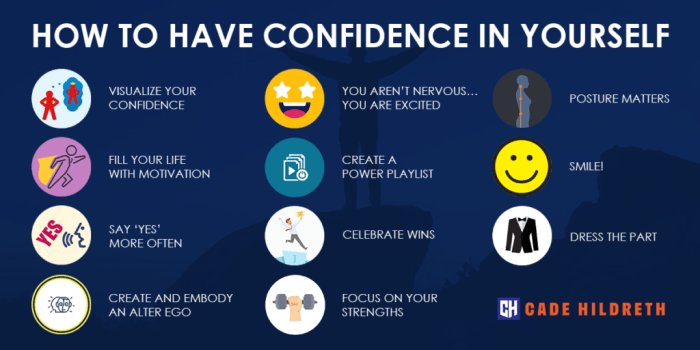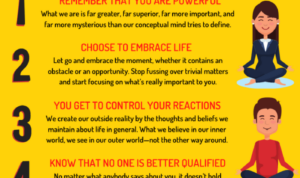Building Self-Confidence dives into the key strategies and tips to help you rock your self-assurance like a boss. Get ready to level up your confidence game!
From understanding what self-confidence means to exploring its impact on personal growth and success, this topic is all about owning your worth and shining bright.
Define Self-Confidence
Self-confidence is the belief in one’s abilities, qualities, and judgment. It is the assurance in oneself to handle challenges, take risks, and pursue goals with a positive attitude.
Examples of Self-Confidence in Behavior, Building Self-Confidence
- Speaking up in class discussions without fear of judgment
- Taking on leadership roles in group projects
- Setting boundaries and standing up for oneself in difficult situations
- Trying new activities or hobbies without worrying about failure
Importance of Self-Confidence in Personal Growth and Success
Self-confidence is essential for personal growth and success as it:
- Helps individuals overcome challenges and obstacles
- Encourages taking risks and stepping out of comfort zones
- Builds resilience in the face of failure or setbacks
- Increases motivation to pursue goals and dreams
Factors Influencing Self-Confidence

When it comes to self-confidence, there are various internal and external factors that can greatly influence how a person views themselves and their abilities. Understanding these factors is crucial in developing a strong sense of self-confidence.
Internal Factors:
Internal factors are those that come from within an individual and can have a significant impact on their self-confidence. These factors include:
- Self-esteem: How a person views themselves and their worth can greatly affect their self-confidence. Those with high self-esteem are more likely to believe in their abilities and feel confident in themselves.
- Self-perception: The way a person perceives themselves, their strengths, and weaknesses can play a role in their self-confidence. Positive self-perception can lead to higher levels of self-confidence.
- Mindset: A growth mindset, where a person believes they can improve and grow, can lead to higher levels of self-confidence compared to a fixed mindset where one believes their abilities are set in stone.
External Factors:
External factors are those that come from outside influences and can impact a person’s self-confidence. These factors include:
- Social interactions: How others treat and perceive an individual can greatly affect their self-confidence. Positive interactions and support can boost confidence, while negative interactions can lower it.
- Media and societal standards: The portrayal of beauty, success, and other ideals in media can influence how a person views themselves and their self-worth, impacting their self-confidence.
- Feedback and validation: Receiving positive feedback and validation from others can boost self-confidence, while constant criticism or lack of validation can lower it.
Role of Past Experiences:
Past experiences, especially during childhood and formative years, can shape a person’s self-confidence. Positive experiences, such as success in academics or sports, can boost confidence, while negative experiences like bullying or failure can lower it. It is important to reflect on past experiences and work towards building a positive self-image to improve self-confidence in the present and future.
Building Self-Confidence
Building self-confidence is crucial for success in various aspects of life, including personal relationships, academics, and career advancement. By taking proactive steps to boost self-confidence, individuals can overcome self-doubt and achieve their goals with a positive mindset.
Strategies for Boosting Self-Confidence
- Practice self-care: Taking care of your physical and mental well-being can boost self-confidence. This includes getting enough rest, exercising regularly, and engaging in activities that bring you joy.
- Set realistic goals: Break down big goals into smaller, achievable steps. Celebrate each small success along the way to build confidence in your abilities.
- Acknowledge your strengths: Focus on your strengths and accomplishments rather than dwelling on your weaknesses. Remind yourself of past achievements to boost self-esteem.
- Challenge negative thoughts: Replace self-critical thoughts with positive affirmations. Practice self-compassion and treat yourself with kindness and understanding.
Practical Tips for Overcoming Self-Doubt
- Avoid comparing yourself to others: Everyone has their own journey and strengths. Focus on your progress and growth instead of comparing yourself to others.
- Seek constructive feedback: Ask for feedback from trusted friends, family, or mentors to gain a different perspective on your abilities and strengths.
- Step out of your comfort zone: Trying new things and facing challenges can help you build resilience and confidence in your abilities to overcome obstacles.
- Practice positive self-talk: Replace negative self-talk with encouraging and empowering statements. Believe in your potential and capabilities.
Significance of Setting Achievable Goals
Setting achievable goals is essential for enhancing self-confidence as it provides a roadmap for success and progress. When you set realistic and measurable goals, you create a sense of direction and purpose, which can motivate you to take action and overcome self-doubt. By achieving these goals, you reinforce your belief in your abilities and build a strong foundation for continued growth and success.
Benefits of Self-Confidence: Building Self-Confidence

Having self-confidence can have a profound impact on various aspects of our lives, leading to mental well-being, improved relationships, and enhanced career success.
Contribution to Mental Well-Being
Self-confidence plays a crucial role in mental well-being by reducing feelings of anxiety, stress, and self-doubt. When individuals believe in themselves and their abilities, they are more likely to face challenges with a positive mindset and resilience, ultimately leading to better overall mental health.
Impact on Relationships and Social Interactions
Self-confidence is key to forming and maintaining healthy relationships. When individuals are confident in themselves, they are more likely to communicate effectively, set boundaries, and express their needs. This, in turn, fosters stronger connections with others and enhances social interactions, leading to a more fulfilling social life.
Career Advancement and Success
Self-confidence is a crucial factor in career advancement and success. Individuals who exude confidence are more likely to take on challenges, pursue opportunities for growth, and showcase their skills and expertise. This can result in more recognition, promotions, and overall career satisfaction, ultimately leading to long-term success in the professional realm.
